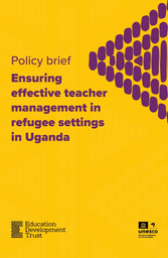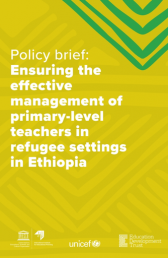Online version
About the publication
This report examines the ability of teachers in developing countries to study their educational systems and to develop curriculum materials appropiate to local schools and local conditions, in the face of attitudes and policies frequently inconductive to innovative effort. Part one examines the need for involving teachers in research and survey work, the types of investigation they may profitably undertake and the support they require to do so. Need exists on both the personal level (the teacher as participant in planning and improvement) and higher organizational levels (researchers are unable to collect the volume of information that is lacking at all levels). Possible investigations fall into three areas: (1) collection of data relevant to planners (e.g., enrollments, programs of study), (2) inventories of learning resources (written resource materials, physical, cultural, and material resources), and (3) studies of the learners (e.g., cognitive development, socio-cultural studies, health). Support should include human support --an evidencing of interest in the teachers' projects and aid for their development. Part two examines the local production of curriculum materials, including (1) booklists and bibliographies, (2) sources and resources for the teacher, (3) guides and notes for the teacher, (4) materials for pupils, (5) audiovisual aids, and (6) teaching equipment. The final section of the report, examining policy implications, suggests that reconsideration of policy may be necessary on (1) investment in professional stimulation, (2) local autonomy, and (3) reward systems (from ERIC database)










